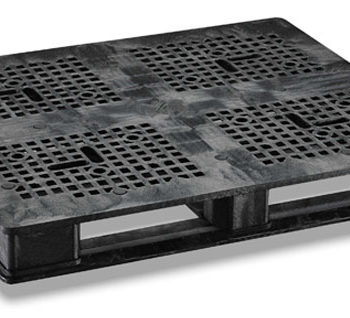What Is The Weight Capacity Of Plastic Pallets?
05 Oct 2023

How much weight can a plastic pallet handle? It’s a fair question and one we’ve encountered multiple times here at Plastic Pallets. When we’ve discussed this with our customers, we’ve noticed they’re often surprised by the answer. It’s easy to underestimate how strong plastic pallets can be, and people tend to assume they can withstand less than wooden pallets, but the two types are relatively similar.
There are several factors to bear in mind. For example, the type of plastic that was used to make the pallet can affect how much weight it can handle. It also depends on how evenly distributed the load is, whether it’s going to be stationary or in transit, and how secure it is. Let’s take a closer look and examine this in greater detail.
Load Bearing Plastic Pallets
It goes without saying that different size pallets can handle different weights. The average plastic pallet can hold materials up to 1500 pounds (680 kilograms), but the best ones can do far more than that. Rackable pallets are the strongest type available and the best quality ones can support up to 2800 pounds (1270 kilograms). To put that into perspective, that’s as heavy as a fully grown American bison.
On the other hand, wooden pallets can withstand up to 3000 pounds (1360 kilograms). That’s only a marginal advantage over the best rackable plastic pallet, but it’s still a higher number. If we look at these basic terms, timber pallets would appear to be the winners, but it’s not that straightforward, and there are other things to consider.
Wooden Pallets Or Plastic Pallets?
While wooden pallets tend to be stronger, they also weigh more. Why is this important? Well, if your business shipping costs are calculated based on weight, that can have a significant impact on the price. The average wooden pallet weighs between 30 and 70 pounds, whereas plastic pallets are much lighter. They average out at around 15 pounds, and it’s even possible to get plastic pallets that weigh as little as three pounds. Yes, this is the very lowest end of the scale, but it highlights the stark difference in the weight of the pallets themselves. If you’re using lots of them to ship your products around the world, choosing plastic pallets can reduce your expenses.
The type of product the pallet is carrying is important, too. Not all loads behave in the same way, and using the same type of pallet for everything isn’t a great idea. If you have to transport liquids, we would always recommend choosing plastic. Regardless of how much you plan in advance, there will always be a risk of spillages, and not only is plastic easier to clean, but it’s also less likely to be permanently contaminated. If a drum filled with chemicals springs a leak, it can seep into a wooden pallet and render it unusable, whereas a plastic pallet can be cleaned and used again.
Other Factors
Additionally, there are certain countries that place significant restrictions on the types of pallets they allow. For example, places like Australia or Madagascar have very strict rules on what crosses their borders due to the unique ecosystems they have. Small insects and fungi can hitch a ride inside timber pallets and can threaten the natural biodiversity of these countries, whereas this isn’t a problem if you use plastic.
As a final point, we also have to mention weight distribution. We hinted at this earlier, but it’s always worth emphasising. Your pallet might have a top weight-bearing capacity of 2800 pounds, but if that is entirely focused on one corner, you risk damaging it. Try to distribute your goods evenly across your pallets, and remember that things can shift during transit. For the sake of safety (not to mention, peace of mind), we would suggest not fully loading your pallets and trying to stick below the maximum weight limit. Plastic pallets tend to have wide, flat bases, whereas wooden ones sometimes have narrow runners, so they are more likely to be damaged by shifting cargo.
Each individual pallet comes with a load-bearing guide, which gives you a detailed breakdown of how much it can carry. So long as you respect these limits and don’t try to push too far, they’ll last far longer. You’ll not only get repeated use out of your plastic pallets, but you’ll also get a safer work environment.
Plastic Pallet Prices
For more information, you’re welcome to contact us via our online form or by ringing our helpline on 03301757766. Our expert staff will be available to answer any questions you might have. Alternatively, if you’d like to place a large-scale or unique order for our pallets, our free quoting engine will find you a competitive price. Get in touch today and see how Plastic Pallets can help you.
